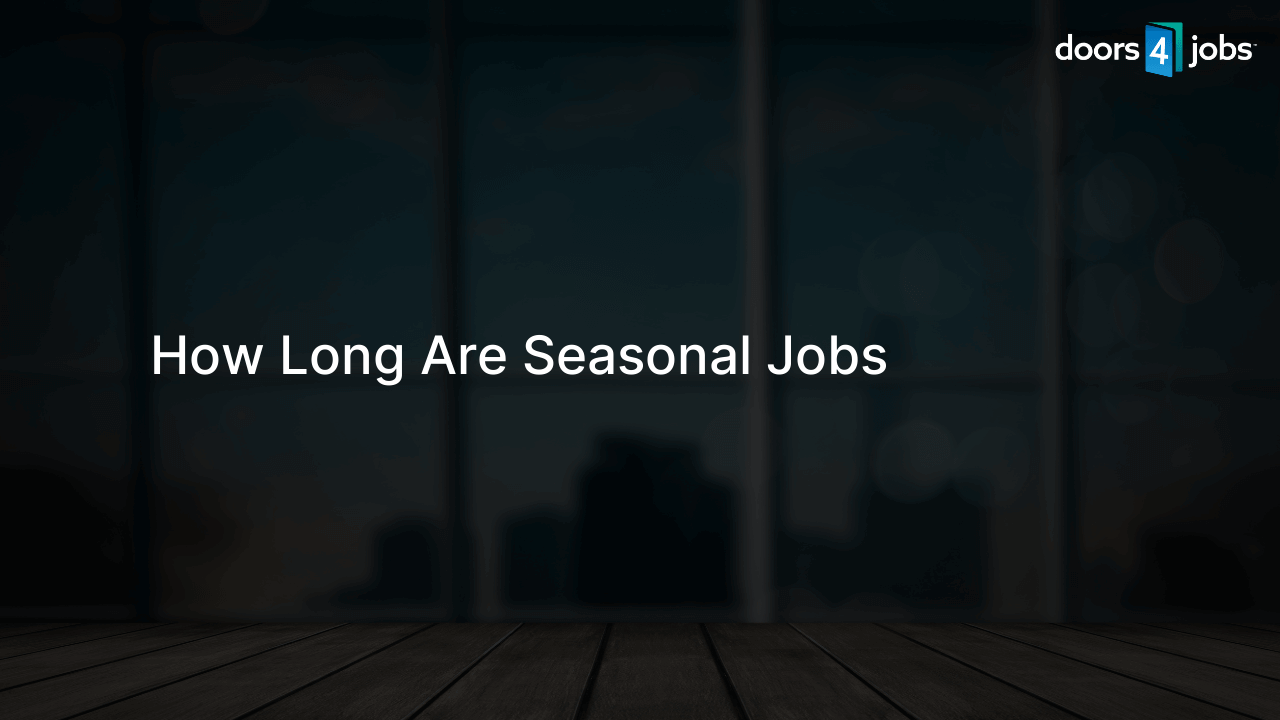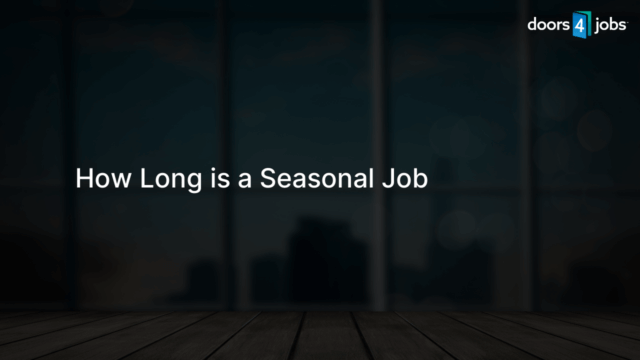Seasonal jobs typically last for a specific duration, usually between 3 to 6 months, aligning with busy periods or changes in weather, such as summer vacations, winter holidays, or agricultural seasons.
Seasonal Job Durations
Seasonal jobs are temporary positions performed during specific times of the year, aligning with demands or changes in weather. These positions typically last between 3 to 6 months and offer flexibility to both employees and employers.
Common Seasonal Job Industries
1. Tourism and Hospitality
Summer resorts, amusement parks, and vacation hotspots often hire seasonal employees to accommodate the influx of tourists.
2. Agriculture and Farming
During harvesting and planting seasons, temporary workers can be employed for activities such as fruit picking and farm maintenance.
3. Retail and Sales
During peak sale periods such as the winter holidays, retail stores and sales companies hire additional staff to manage the increased workload.
4. Education and Summer Camps
Teachers and camp counselors may be hired on a seasonal basis during school breaks to conduct programs and events for children.
Benefits of Seasonal Jobs
Seasonal jobs offer unique benefits such as flexibility, gaining experience in new industries, and potential opportunities for permanent employment.
Finding and Applying for Seasonal Jobs
Job seekers can find seasonal job postings on online job boards, company websites, and local newspapers. To increase chances of being hired, apply early and tailor your resume to highlight relevant skills and experiences.
Seasonal Job Commitment
Seasonal jobs often require full-time or part-time commitment during the duration of the position. Employees may be expected to work weekdays, weekends, or both, depending on the industry and specific role.
Tax Implications of Seasonal Jobs
Seasonal employees are responsible for reporting their income and paying taxes accordingly. Employers generally withhold income taxes from paychecks, but it’s essential for workers to understand their tax liabilities and plan accordingly.
Tips for Success in Seasonal Jobs
To excel in a seasonal job, develop a positive attitude, demonstrate punctuality and strong work ethic, and establish good relationships with coworkers and supervisors. These qualities may lead to positive references, networking opportunities, and even full-time employment offers.
Returning to a Seasonal Job
Seasonal employees who excel in their roles may be offered the opportunity to return for subsequent seasons. Establishing a strong professional reputation can increase the chances of being rehired on a seasonal basis.
Transitioning to Permanent Employment
Seasonal positions may lead to permanent employment if a company has available positions and is impressed by an employee’s performance. Networking and showcasing relevant skills throughout the season can improve conversion chances.
Understanding Seasonal Job Contracts
Before committing to a seasonal job, review the contract carefully to understand the terms of employment, compensation structure, and applicable employee rights. This will ensure clear expectations between both employee and employer during the seasonal engagement.
FAQs: Seasonal Jobs and Durations
When considering seasonal employment, many job seekers have questions about the nature and specifics of these temporary positions. Here are answers to five common questions related to seasonal jobs:
What is a seasonal job?
A seasonal job is a temporary position that usually lasts between 3 to 6 months, coinciding with peak periods or changes in weather, such as holiday seasons, summer breaks, or agricultural requirements.
Do seasonal jobs offer benefits?
While benefits vary based on the employer, seasonal jobs can provide flexibility, experience in new industries, networking opportunities, and the potential for transitioning to permanent positions.
How do I find seasonal job opportunities?
Online job boards, company websites, and local newspapers are good sources for finding seasonal job postings. Applying early and targeting your resume to showcase relevant skills and experiences can increase your chances of getting hired.
Can a seasonal job lead to permanent employment?
Yes, a seasonal job may lead to a permanent position if a company has open positions and is impressed by an employee’s performance. Networking, exhibiting a strong work ethic, and showcasing valuable skills can improve your chances of being offered a full-time role.
What are the tax implications of seasonal jobs?
Seasonal employees are responsible for reporting their income and paying taxes accordingly. Employers may withhold income taxes from paychecks, but it’s important for workers to understand their tax liabilities and plan accordingly.











